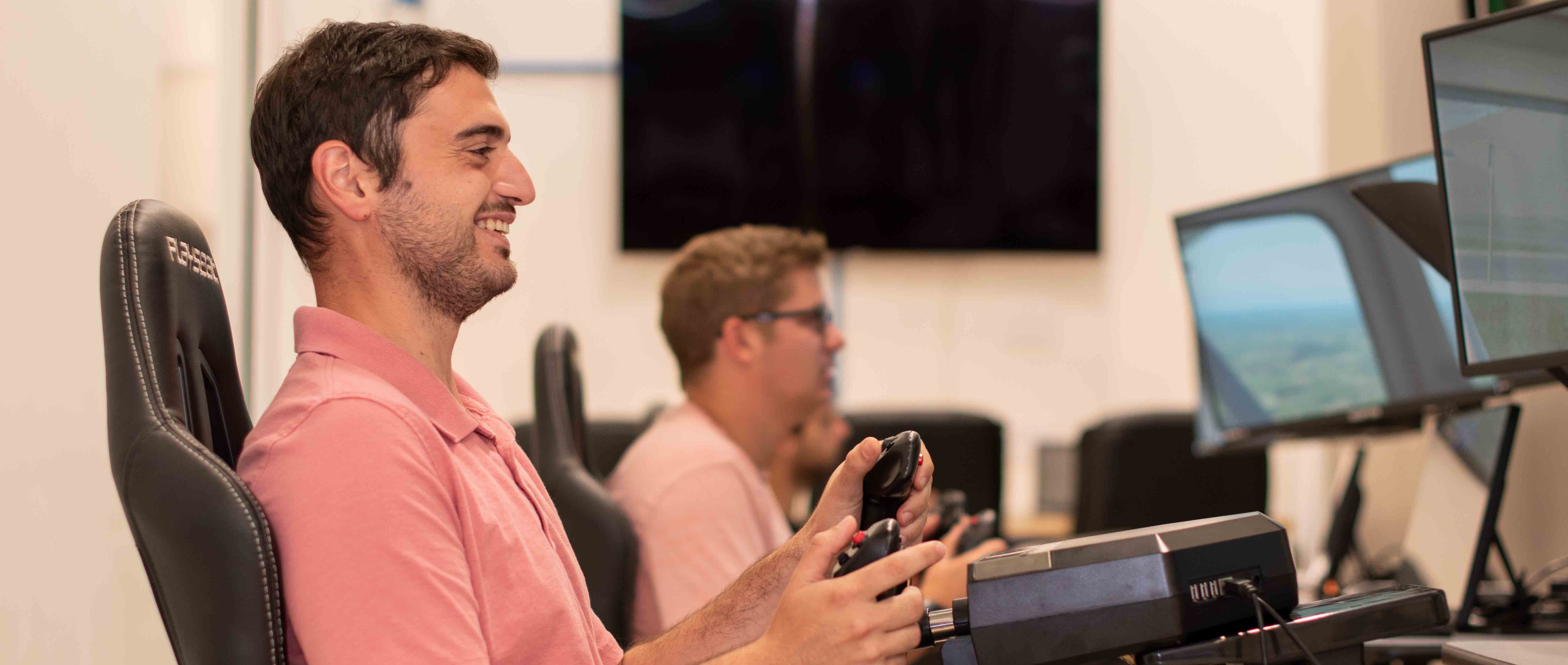The program’s first class of four graduates have paved the way for many more to come.
In May 2021, the University of South Carolina graduated the state’s first ever class of aerospace engineers. These students are the product of years of behind-the-scenes work by UofSC College of Engineering and Computing faculty and leadership to create an undergraduate aerospace engineering program. They also are the first of many that will soon be filling one of South Carolina’s biggest workforce needs.
“South Carolina is a major aerospace state, and it is so by its strategic plan of about two decades ago,” says Hossein Haj-Hariri, dean of the UofSC College of Engineering and Computing. “The economic impact of aerospace in our state is significant. And yet, there was no option for South Carolinians to pursue a B.S., M.S., or Ph.D. in aerospace. The only option was through articulation agreements with our neighboring states that offered such degrees. Given the singlemindedness of students who want to pursue aerospace studies, not offering these degrees in SC resulted in our losing some of our brightest students to neighboring states. Our faculty remedied that undesirable outcome, and now we have one of the larger aerospace programs in the US.”
UofSC’s aerospace engineering undergraduate program began in 2018 after the college’s leadership saw extreme success in offering a minor in aerospace education. Its first class had just four students, with all switching their major from mechanical engineering to explore the new offering. However, the ensuing class sizes have grown dramatically: this year, 37 seniors will be graduating as the program’s second class. Following them are 60 juniors and over 70 sophomores.
The program’s leaders think that the explosion in interest is due to the aerospace engineering program’s unique scope.
“What separates aerospace from a lot of other disciplines is that you have to take account of everything else that's going on,” says Wout De Backer, a research assistant professor who teaches some of the program’s courses. “You can't just focus on the weight; you have to also think about aerodynamics, you have to think about performance, and so on. So really, aerospace is propulsion, it’s structures, it’s materials, it’s aerodynamics and flight performance. It's even space applications and the effect of challenging environmental conditions on all of those fields.”
Already, demand for the program’s students is high. With The Boeing Co. and Lockheed Martin among the over 400 aerospace firms operating in the state, the industry’s impact totaling $28.8 billion, and no other universities in South Carolina offering undergrad degrees in aerospace, the CEC’s graduates are highly sought after. From the first graduating class, one student has been hired into a private industry, two are continuing their education with master’s degrees and one is pursuing an aircraft maintenance degree for flight testing.
Ana Victoria Kock, one of the program’s first four graduates, says that working in aerospace engineering had been a dream of hers since she was a kid. Now, as she begins her master’s in aerospace engineering with a particular emphasis on fuel, combustion, and propulsion at UofSC, she feels prepared for whatever lies ahead, saying, “I feel the aerospace engineering major taught me how to be thrown into an unknown situation and use my engineering skills, intuition, creativity and teamwork to solve it while remaining critical of my own solutions.”
More so than any other engineering degree, the aerospace engineering curriculum prepares students for careers outside of the engineering sector. Quite a few, says Haj-Hariri, end up working in the financial sector — with the multidisciplinary nature of the curriculum preparing students for careers in management consulting and even banking. Whatever industry they go into, the program’s graduates are prepared to leave a lasting impact.
“Our goal is to produce high-quality aerospace engineers that not only benefit South Carolina, but also benefit the entire world,” says Sang Hee Won, interim director of the aerospace engineering program. “And we are. Even with the success of this first class, we will be continuously improving our aerospace curriculum.”
As the number of students in the program expands, the college is looking to grow the resources available to these students. The CEC is currently renovating its building at 300 Main Street to include designated aerospace lab areas. It is installing 10 fixed-bed flight simulators for the program’s students to use in their aerospace labs and senior design projects. The college is also relocating the McNair Center’s new full-motion flight simulators so that the aerospace engineering program’s academic spaces are centralized for its students.
“I think we've proven that there is a need for this program, and there's a desire for it from the student side and from the industry side,” De Backer says. “I think we can cater to that need, and really be a world player when it comes to this. Aerospace programs are not offered everywhere. They're very scarce, and I think we have a good foundation here to build a world-class program.”
